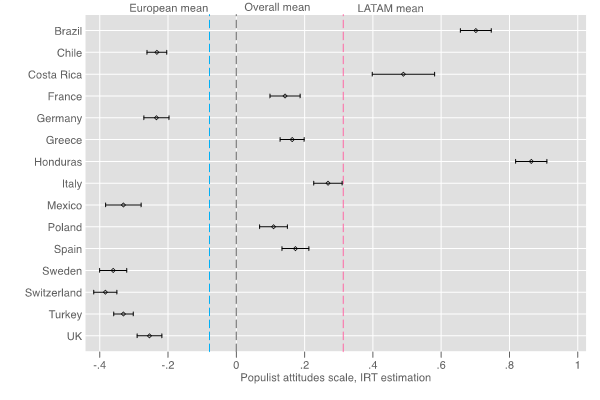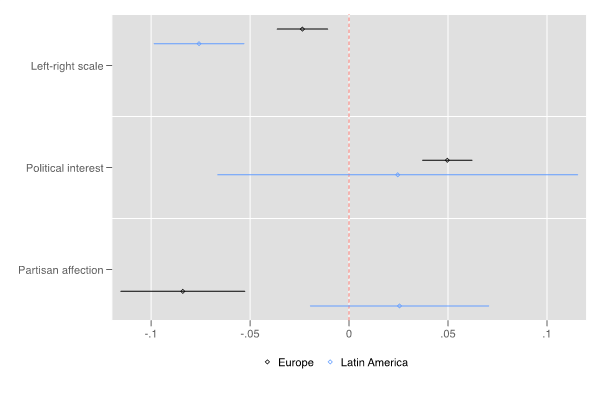
 Are populist attitudes compatible with the principles of democracy? Drawing on a new study, Cristóbal Rovira Kaltwasser and Steven M. Van Hauwaert explain there is evidence populist citizens across the world adhere to democracy as a political system, but are disgruntled with how the democratic regime functions in their own country. Rather than conceiving of those who support populist ideas as alienated authoritarians, they may be more accurately described as ‘dissatisfied democrats’.
Are populist attitudes compatible with the principles of democracy? Drawing on a new study, Cristóbal Rovira Kaltwasser and Steven M. Van Hauwaert explain there is evidence populist citizens across the world adhere to democracy as a political system, but are disgruntled with how the democratic regime functions in their own country. Rather than conceiving of those who support populist ideas as alienated authoritarians, they may be more accurately described as ‘dissatisfied democrats’.
A recent surge in populism studies has shifted its analytical focus from the supply side to the demand side. Whereas much initial research emphasised populism as a party-political phenomenon, populism in government or populism as a normative construct, contemporary scholarship has taken a newly found interest in populism amongst individuals. That is, scholars have become interested in how populism translates into an individual-level construct and the extent to which voters adopt this as part of their worldview. Most commonly, this notion is coined populist attitudes.
At the moment, four noteworthy conclusions can be drawn from this recent scholarship. First, numerous country-level studies (e.g. in the Netherlands and Chile) show that populist attitudes are widespread across the citizenry. This falls in line with the supply-side evolution Cas Mudde has termed the ‘populist Zeitgeist’. More generally, that means populism (and populist attitudes) are, thus, a pathological normalcy at the mass level.
Second, those same studies additionally highlight that populist attitudes are not only widespread but also relatively high amongst populations. Through the use of six or eight survey items that are slowly becoming somewhat of an industry-standard, levels of populism are often found to be sizeable, regardless of populist supply. At the same time, recent measurement studies highlight that further research into the accurate and complete measurement of populist attitudes remains necessary.
Third, while populist attitudes might be high and omni-present, they are neither always nor continuously operational. As a disposition, they often remain latent and need to be activated through context or political cues. Various experimental studies show that the activation of populist attitudes is not unanticipated, but is rather the result of failures of democratic representation that can be attributed to elite behaviour.
Fourth, an extensive literature shows that populist attitudes are vital predictors of political behaviour. Most importantly, populist attitudes explain important parts of popular support for populist parties. Additionally, recent research also highlights that populist attitudes can explain negative identities, expressions of direct democracy and political engagement.
Profiling populist citizens
Altogether, this provides us with extensive insights into the notion of populist attitudes. Yet, an in-depth analysis of the characteristics of individuals with populist attitudes remains largely absent. That means we have little empirical knowledge about the populist masses, or populist citizens as we will refer to them. In a recent study, we provide some first insights into three particular profiles of populist citizens, namely socio-demographic, political and democratic. That is, we map the features alongside these three profiles that unite and distinguish populist citizens across five Latin American and nine European countries, plus Turkey.
This unique sample across world regions allows for some unprecedented insights. Most importantly, we find suggestive evidence that citizens are – on average – more populist in Latin America than in Europe. Even more, the level of populist demand seems to differ across countries without a clear-cut pattern. At first sight, there appears no unequivocal parallel between economic and political development and the intensity of populist attitudes. At the same time, there seems to be no clear or direct link between the existence of electorally strong populist forces and the presence of above-average levels of populist attitudes. While there is some similarity in citizens’ mean levels of populism within clusters of countries in each world region, the overall story of this initial analysis is one of heterogeneity, rather than homogeneity.
Figure 1: Mean values of populist attitudes, by country
Note: For more information, see the authors’ accompanying paper in the European Political Science Review.
If we further explore this variation and scrutinise the populist demand and its origins, we can draw some additional conclusions regarding the profiles of populist citizens. Results from the socio-demographic profile indicate that populist citizens across Europe are mostly made up of modernisation losers (male, older, less educated, unemployed), whereas populist citizens in Latin America do not fit this stereotypical mould. Even more, across world regions, the only shared socio-demographic identifier of populist potential is living outside of a country’s capital region. This reinforces the argument that cosmopolitanism can probably be conceived of as the antithesis of populism.
Figure 2: The sociodemographic profile of populist citizens
Note: AMEs with 95% CIs of OLS regressions with country-fixed effects. For more information, see the authors’ accompanying paper in the European Political Science Review.
When we look at the political profile of populist citizens, we notice similar patterns of variance between world regions. Figure 3 suggests populist citizens across Europe tend to be more interested in politics and unsympathetic to political parties, whereas there is no conclusive evidence regarding political interest and party apathy of populist citizens in Latin America. Both in Europe and Latin America, populist citizens – on average – tend to identify with the left side of a one-dimensional ideological spectrum, but we remain cautious interpreting this finding, as populism is – by definition – neither left-wing nor right-wing in nature. This finding merely illustrates country-level heterogeneity within our sample countries.
Figure 3: The political profile of populist citizens
Note: AMEs with 95% CIs of OLS regressions with country-fixed effects. All models include the socio-demographic variables specified in Figure 2. For more information, see the authors’ accompanying paper in the European Political Science Review.
Finally, we examine the democratic profile of populist citizens by exploring the role of two specific variables, namely democratic satisfaction and democratic support. Contrary to observations related to the socio-demographic and political profiles, we immediately notice an unseen level of homogeneity between world regions and across countries. On the one hand, the democratic satisfaction coefficient is systematically negative, meaning populist citizens tend to be more dissatisfied with democracy – regardless of their national context. On the other hand, the democratic support coefficient is systematically positive, which suggests that populist citizens are more likely to prefer democracy, despite all its flaws, to any other form of government.
Figure 4: The democratic profile of populist citizens
Note: AMEs with 95% CIs of country-specific OLS regressions. All models include socio-demographic variables specified in Figure 2. For more information, see the authors’ accompanying paper in the European Political Science Review.
Together, this result highlights that populist citizens across countries adhere to democracy as a political system but are disgruntled with how the democratic regime functions in their countries. This confirms that populism and democracy are not inevitable opposites. Contrary to some recent accounts, this also shows that populist citizens cannot be reduced to alienated authoritarians. Rather, those who support populist ideas are more accurately described as ‘dissatisfied democrats’.
These results reinforce the argument that the gap between democratic ideals and their practical implementation fosters the demand for populism at the mass level. In other words, there is a positive correlation between populist attitudes and the democratic deficit as it is perceived by citizens. In an of itself, this is an important observation. Yet, research must not stop here. The way ahead consists in providing empirical analyses of the extent to which populist citizens endorse a notion of democracy that it is at odds with some of the key aspects of the liberal democratic order.
For more information, see the authors’ accompanying paper in the European Political Science Review
Please read our comments policy before commenting.
Note: This article gives the views of the authors, not the position of EUROPP – European Politics and Policy or the London School of Economics. Featured image credit: Not So Dusty (CC BY 2.0)
_________________________________
 Cristóbal Rovira Kaltwasser – Diego Portales University
Cristóbal Rovira Kaltwasser – Diego Portales University
Cristóbal Rovira Kaltwasser is a Professor at the School of Political Science of the Diego Portales University (UDP) in Santiago de Chile and an Associate Researcher at the Centre for Social Conflict and Cohesion Studies (COES).
 Steven M. Van Hauwaert – University of Surrey
Steven M. Van Hauwaert – University of Surrey
Steven M. Van Hauwaert is an Assistant Professor (Lecturer) in Comparative Politics at the University of Surrey.









